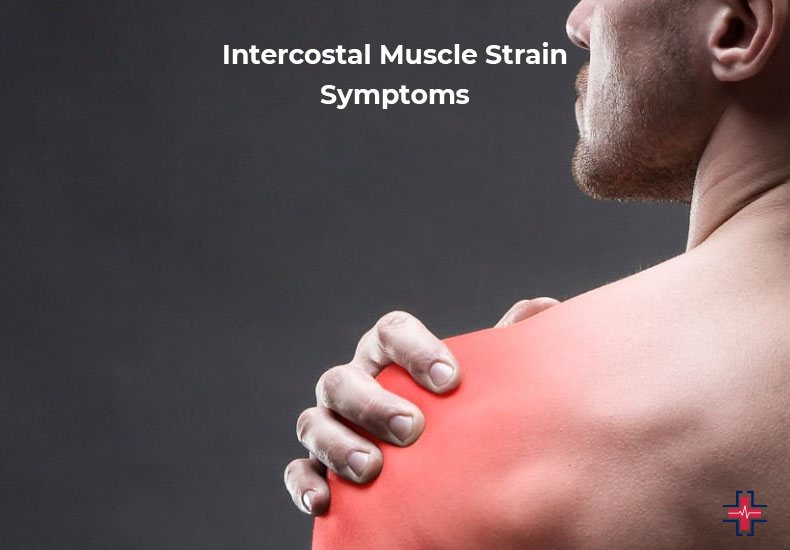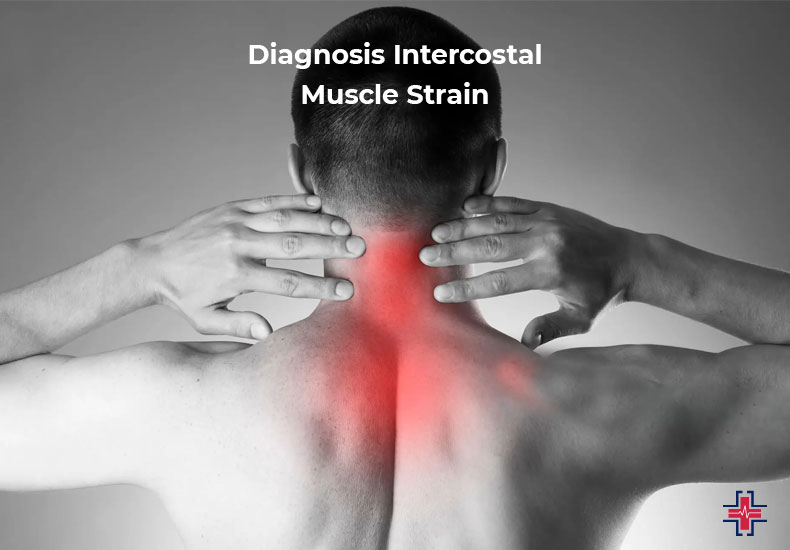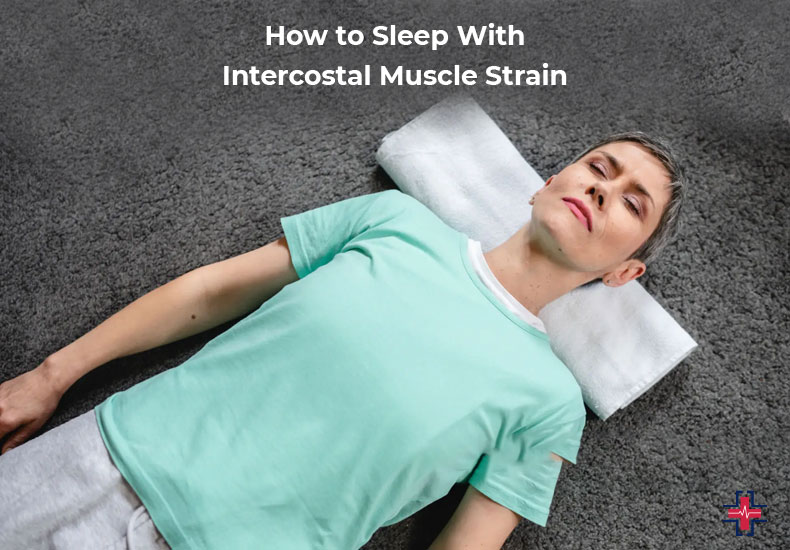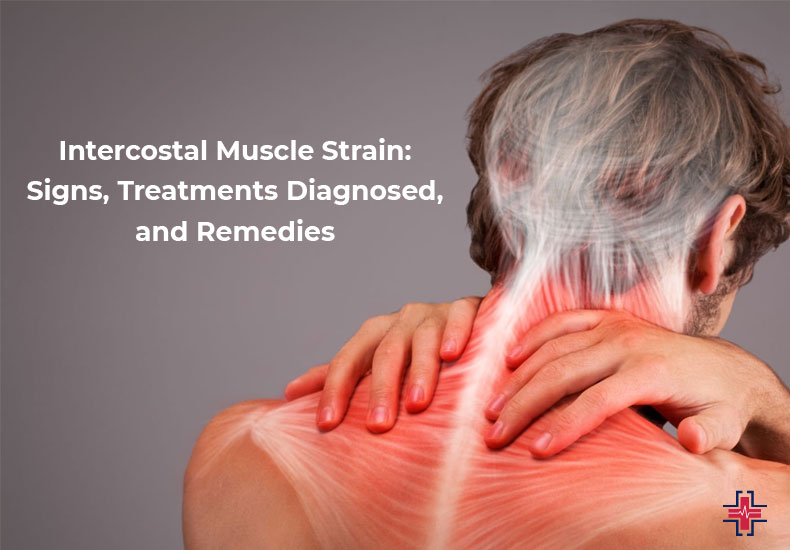To support the formation of the chest wall and aid in breathing, the intercostal muscles are composed of various layers that adhere to the ribs. Intercostal muscular strain results from the tearing of an intercostal muscle that has been twisted, strained, or stretched excessively.
This article looks at the symptoms of an intercostal muscle strain and explains how to distinguish it from other injuries and pains in the upper body. We also examine these strains’ causes and available treatments. In our latest blog post, we delve into the signs, treatments, and diagnosis of this common but often overlooked condition.
Don’t let intercostal muscle strain limit your lifestyle – empower yourself with the knowledge to find relief and foster a swift recovery. Read on to uncover essential insights that could be the key to easing your discomfort and restoring your well-being.
What Is An Intercostal Muscle Strain?
An injury to the intercostal muscles between neighboring ribs is known as an intercostal muscle strain. The external intercostal muscles, internal intercostal muscles, and deepest intercostal muscles are the three layers that make up the intercostal muscles. On the surface of the ribs, the innermost intercostal muscles support and stabilize the ribcage by compressing the ribs. The internal intercostal muscles extend from the posterior to the anterior rib cage and are situated above the innermost intercostal muscles. They assist in stabilizing the rib cage during physical activity and depress the ribs during expiration. The last group of intercostal muscles is called the external intercostal muscles, and it extends from the anterior to the posterior rib cage. They raise the ribs while breathing and control how the ribs move.

Any layer of the intercostal muscles may become overextended, tugged, or even partially torn during a strain, which can cause pain and breathing difficulties. Although there are ways to lessen pain and inflammation, intercostal muscle sprain is a medical problem that resolves on its own.
Intercostal Muscle Strain vs. Other Upper Body Pains
The upper back is often rather motionless, therefore injuries to it happen rarely. If discomfort is coming from this location, it’s usually from chronic bad posture. It might also be the result of a serious injury, like a vehicle accident, that has compromised the stability of the upper spine.
Upper back injuries typically cause people to feel a single, intense point of agony. The discomfort may come and go and may radiate to the neck, shoulder, or other upper body parts.
Almost always, some sort of incident, such as injury or overexertion, results in intercostal muscle strain. In contrast, it might be challenging to identify the initial cause of pain while suffering from pneumonia or other lung problems.
If you can pinpoint the precise location of the pain, like in the space between your ribs, it means your upper back or lungs are not the source of the problem. Sharp, outward-moving lung pain is a common description. The pain from a rib fracture is typically far worse than from an intercostal muscle strain.
The following symptomsTrusted Source may signal a rib fracture:
- Feeling breathless
- A protrusion or a sharp stabbing sensation in the rib area
- An area around the ribs that is extremely tender to touch
- A fractured rib is a medical emergency requiring immediate attention.
Intercostal Muscle Strain VS Pneumonia
It can be challenging to distinguish between pneumonia and intercostal muscle strain because they both induce chest pain. However, there are a few warning signs:
The following are other signs of an intercostal muscle strain:
- Discomfort when you sneeze, cough, or breathe.
- Discomfort when using the afflicted muscles.
- Swelling in that vicinity.
- Pain and tightness in the muscles.
Who’s Most At Risk For Muscle Strains In The Chest?
One of the most typical reasons for musculoskeletal chest pain is straining of the intercostal muscles. However, a sedentary lifestyle or advanced age may increase your risk. Compared to someone who exercises and has developed their muscles, an elderly person with thinner muscles may strain their ribs far more easily.
Intercostal Muscle Strain Symptoms
Depending on the underlying reason, the signs and symptoms of an intercostal muscle strain can vary slightly. However, symptoms are limited to this region and frequently concern respiration because the intercoastal muscles are located in the body’s trunk and are necessary for breathing.

Among the symptoms could be:
- Acute rib and upper back discomfort
- Intense and unexpected agony, especially if brought on by a hit to the back or chest
- Discomfort in the space between your ribs
- Soreness that gradually gets worse after doing physical activities like swimming, rowing, or Other repetitive movements
- Increasing discomfort while inhaling deeply, sneezing, or coughing
- Muscles tense and tight, resulting in upper back pain
- Intercostal muscular spasms
- Stiffness of the muscles during upper body bending or twisting
Common Causes of Intercostal Muscle Strain
is not typically caused by routine activity. The most common causes of these strains are injuries or overuse of the muscles.
Typical reasons include:
- Extended overhead
- A direct hit to the rib cage from an automobile accident or fall
- For instance, while painting a ceiling, reach up.
- An impact hit from a contact sport, like football or hockey
- Bending the torso in a way that isn’t typical
- Strong motions that are repeated, such as hitting a tennis ball
- Twisting when using a weightlifting machine
- Powerful twisting, such as in tennis or golf
- Twisting from some dance or yoga positions
- Raising any weighty thing higher than shoulder level
An intercostal muscle strain can also result from an abrupt increase in physical activity. This is especially true in cases when a lack of activity or bad posture can cause muscle weakness.
Diagnosis Intercostal Muscle Strain
A physical examination is necessary to diagnose intercostal muscle tension. The objective is to evaluate sensitive regions and look for any mobility restrictions. A pulmonary exam, for instance, can be part of this, as it might aid in the diagnosis of issues with the body’s trunk. The physician will also inquire about any recent sports participation or injuries.

An MRI or ultrasound are examples of imaging tests that a medical expert may request. This can assist in ruling out other wounds, like rib fractures.
Intercostal Muscle Strain Treatment
If the damage resulting in an intercostal muscle strain is not severe and the symptoms are not severe, home treatment may be sufficient. The following are some examples of home treatment options:
- Applying a cold pack or ice pack and then using heat therapy. Warm baths, heating pads, or sticky heat wraps are examples of heat therapy methods.
- If breathing hurts, place a cushion against the affected muscle and splint the area. On the other hand, respiratory problems necessitate immediate medical intervention.
- Taking a few days off from all physical activity and resting will help the strained muscles heal.
- Using painkillers to lessen discomfort and swelling. Acetaminophen or ibuprofen are two over-the-counter drugs that may aid with intercostal muscular tightness.
Apart from the above-discussed home cures, the physician might prescribe the following:
- Muscle relaxants for excruciating discomfort and spasms
- Physical therapy (PT)
- If alternative therapies don’t work, an injection of lidocaine and corticosteroids can help with pain and swelling.
How to Sleep With Intercostal Muscle Strain
Falling asleep or staying can be a challenge. Managing your pain is a key step to better sleep and recovery from an intercostal muscle strain. There are several strategies you can use to relieve symptoms and get the full night of rest you need.

Stretching And Breathing Exercises For a Gentle Workout
To speed up healing and make sure that the discomfort from your injury doesn’t unnecessarily restrict your ability to breathe, your healthcare practitioner can advise stretching and breathing exercises.
Incorporating these exercises into a nightly routine may also be beneficial because research indicates that deep breathing can help lessen tension and pain. Move slowly, and if the discomfort gets worse, see your doctor.
Avoid External Pressure And Keep Your Torso Neutral
Think about adjusting your sleeping position if intercostal muscle strain pain prevents you from falling asleep. To prevent unintentional twisting or placing more weight on the injury, the optimal sleeping position keeps the spine in its natural alignment and the body in a neutral position. If you sleep on your side, you could find that sleeping on the uninjured side is more pleasant. To support your head, neck, and upper body, choose a mattress that is both soft and supportive.
You might find that keeping your upper body raised helps, especially in the early days. Try using cushions to prop yourself up, or, if you have one, an adjustable base.
Pain-Reducing Meditation Exercises
Based on preliminary findings, practicing mindfulness meditation may help reduce discomfort and encourage physical relaxation. Although there are numerous variations of meditation, they often consist of the following elements:
- Assuming a comfortable seated position
- Meditating in a peaceful area
- Concentrating on breathing, a thing, or a few words
- Keeping an open mind and allowing distractions to come and go without passing judgment
Maintain Good Sleep Hygiene
Establishing healthy routines can help prepare the way for restorative sleep. Among the components of sound sleep hygiene are:
- Maintaining a Regular Sleep Schedule: Sound sleep is facilitated by going to bed and waking up at the same time every day, including weekends.
- Establishing a Bedtime Routine: You can relax before going to bed by doing things like reading, meditation, or a warm bath.
- Creating a Cozy Sleeping Ambience: A peaceful, cool, and dark bedroom is what you want. Make the atmosphere more sleep-friendly by using sleep aids like earplugs or an eye mask, if needed. To keep light from entering the space, you can also employ blackout curtains or a white noise machine to block out background noise.
- Restricting Your Bed Use to Sex and Sleep: If you are having trouble falling asleep, try not to lie in bed for more than 20 minutes at a time. This will assist your brain in establishing a link between your bed and sleep. Rather, engage in a soothing activity in a different room and return to bed when you’re tired.
See your doctor if you are still having trouble falling or staying asleep. They can assist in determining whether an underlying sleep issue is interfering with your capacity to obtain a full night’s rest.
Talk to Your Doctor
For your healthcare practitioner to create a treatment plan that works for you, you should let them know about your pain threshold and sleep issues. Tell your doctor about all of the therapies you are presently using or have tried, including heat therapy and over-the-counter pain medicines.
Your healthcare practitioner may administer lidocaine or corticosteroids via injection to the affected area in more severe cases if the muscles are still being reinjured. These injections have the potential to reduce discomfort.
When to go to the ER for Intercostal Muscle Strain?
Since there are several possible causes of chest pain, intercostal muscle strains can be challenging to diagnose. It is recommended to make an appointment with a healthcare provider to receive a diagnosis if your chest pain persists for longer than three days.
While other types of chest pain might be quite dangerous, intercostal muscle strains usually aren’t. Let’s say you have had a fall or a direct injury to your chest. In that situation, you need to visit a doctor to make sure no bones are broken or misplaced. To ensure that your chest pain is only the result of a muscle strain, visiting a healthcare professional can help rule out other illnesses.
If your intercostal muscles feel strained, you’ll probably need to go to the emergency department. In Mesquite, are you trying to find an emergency care facility? ER of Mesquite is the only place to look. We are a 24 hour emergency room that treats Intercostal Muscle Strain with compassion and promptness.
